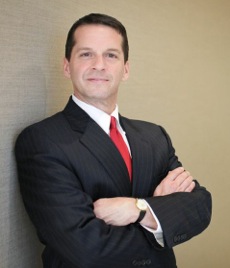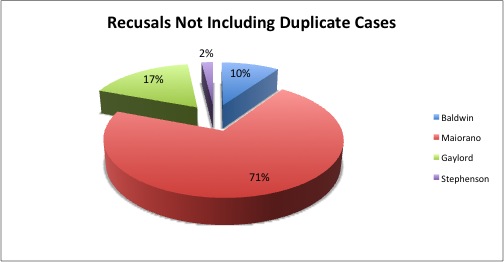Sitting councilors recused themselves due to conflict of interest less than 10 percent of the time since January 2014, an analysis of meeting minute archives shows.
Of the 1,047* votes taken by council, there were 84 instances in which one of the members requested to be excused from a vote due to a potential conflict of interest. This works out to just around 8 percent of total votes cast by council.
Of these instances, 31 were for cases on which councilors had previously recused themselves. If we remove these cases from both numbers (meaning we pull the 31 repeated cases out of the total number of recusals and the total number of votes cast) the percentage of recusals drops from 8 to 3 percent.

Wayne Maiorano
More interesting, perhaps, is what happens when we leave in these duplicates, but remove the cases in which outgoing District A Councilor Wayne Maiorano recused himself. Maiorano, a lawyer, had a significant number of clients, past and present, who appeared before council.
Maiorano recused himself a total of 54 times during the period between January 7, 2014 and August 4, 2015. His recusals account for 64 percent of the total number.
17 of those cases from which Maiorano recused himself were ones which appeared before council multiple times, which means that over 20 months, there were 37 cases in which the councilor perceived a potential conflict of interest.
If the instances in which Maiorano (who is not seeking re-election) sought recusal are removed from the total, the percentage of total votes in which a councilor recused themselves falls to less than 3 percent. In a few instances, multiple councilors asked to be excused from the same vote, although we did not factor this into our overall analysis.
For fun, though, we removed all of Maiorano’s numbers from the total, along with cases that appeared multiple times. This left us with a total of 16 votes from which a councilor not named Wayne Maiorano asked to be recused, or about 1.5 percent of the total votes held between January 2014 and August 4, 2015.
Of those 16 cases, Councilor Mary-Ann Baldwin, who is employed by local contracting firm Holt Brothers, recused herself five times. Councilor Bonner Gaylord, the general manager at North Hills, which is owned by the local development firm Kane Realty, recused himself 9 times. Councilor Russ Stephenson, a local architect and urban planner, recused himself once for a case involving a project in the warehouse district. The final recusal was requested by former Councilor Thomas Crowder.

Councilor Maiorano recused himself from a total of 37 cases, Gaylord 9, Baldwin, 5 and Stephenson 1.
We have previously reported on the subject of recusals, after noticing an uptick in ones requested by members of the city’s planning commission in 2012. The explanations we received, although they were for a different body, apply just as easily when it comes to finding out the motivation behind council’s recusals. Here are some selections from that piece:
Ken Bowers, the city’s deputy planning commissioner, explained that a slight uptick in recusals means simply that the commission is doing its job.
Members, he said, “have to weight their business interests against their service on the commission.”
“It can have an impact on their business because they can’t represent their clients – my guess is it probably has a negative impact,” Bowers said.
Isabel Mattox, a land-use attorney who joined the Commission in 2010 and now serves as its chair, was responsible for 62 percent of the 2012 recusals. Mattox explained that she recuses herself not only from cases she may have worked on personally, but ones on which close colleagues may have worked on as well.
“I think it’s useful to have people on board, the Commission that have some experience, some expertise or knowledge in certain areas,” Mattox said. “Therefore, if you have people working in that area, generally, they’re going to have some cases where they’re going to recuse themselves.”
Steve Schuster, an architect with Clearscapes who also sits on the Commission and whose recusals accounted for 20 percent of the overall 2012 numbers, agreed with Mattox’ assertion.
“Obviously we all subscribe to and are committed to following the city’s policies on conflict of interest,” Schuster said. “So I think you’ll find for many of the commission members, they recuse themselves often beyond what the city’s policy would mandate.”
*This number of 1,047 was derived through an analysis of council meeting minute archives for a period dating between January 7, 2014 and August 4, 2015. Many of these votes were procedural, and on matters in which it which there is almost zero likelihood of a conflict of interest. It is likely some votes were missed, or over-counted, so we do not present it as an exact number, but rather a close approximation. The recusal numbers are more accurate, and while human error is always a possibility, we’re relatively confident the total is within an insignificant margin of error.
If you would like a copy of the spreadsheet(s) in which this data is compiled, please e-mail editor@raleighpublicrecord.org.
